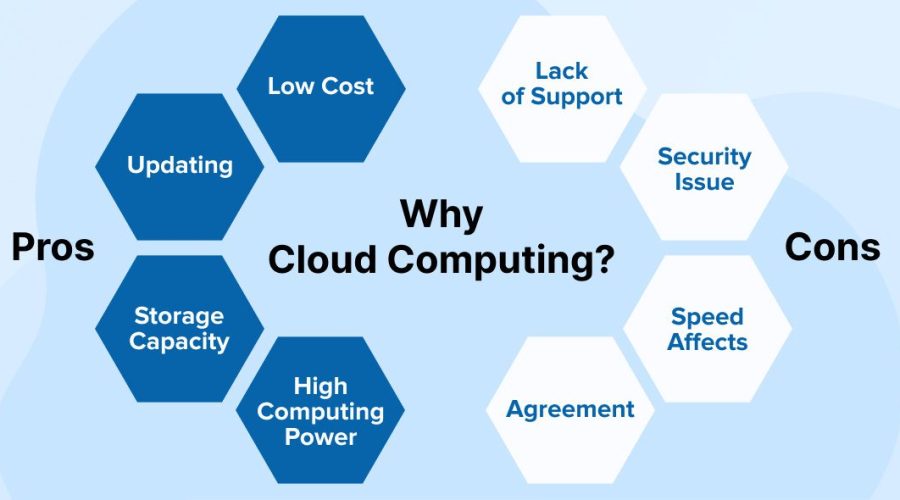Cloud computing has emerged as the go-to technology for business. It allows companies to move their data, applications, and other computing resources to the cloud so that users can access them from anywhere with an internet connection.
However, like any other technology, cloud computing has pros and cons. In this blog, we’ll be discussing the advantages and disadvantages of cloud computing.
Pros and Cons of Cloud Computing

Pros of Cloud Computing
1. Data backup and recovery
One of the most significant advantages of cloud computing is its ability to provide reliable and efficient data backup and recovery solutions. By using cloud computing services, businesses can store their data in secure off-site locations, reducing the risk of data loss due to disasters such as fires, floods, or cyber-attacks. In addition, cloud-based backup solutions offer fast and easy recovery of lost data, ensuring that businesses can resume operations quickly and without any significant loss.
2. Low maintenance cost
Another significant advantage of cloud computing is its low maintenance cost. By using the services of a cloud provider, businesses can eliminate the need for expensive hardware purchases and maintenance, as well as reduce the need for in-house IT staff. Cloud computing service providers will typically handle hardware maintenance, software updates, and other maintenance tasks, reducing the burden on businesses and allowing them to focus on their core business instead of worrying about maintaining their massive data
3. Data security
Cloud computing service providers also provide strong data security solutions that can help businesses protect sensitive information from cyber-attacks and data breaches. A variety of advanced security measures like encryption techniques, firewalls, multi-factor authentication, regular security audits, and other security measures are used to protect data stored in the cloud. In addition, cloud providers often employ dedicated security teams to monitor the infrastructure and respond to any security threats quickly.
4. Reduced costs
By moving to the cloud, businesses can reduce their upfront costs and pay only for what they use. This helps businesses eliminate costly investments in IT infrastructure and helps scale their operations up or down quickly and efficiently without incurring any loss. It can also help reduce IT staffing costs since all IT maintenance is outsourced to a cloud service provider.
5. Improved collaboration
Cloud computing services help improve collaboration among teams and different departments within an organisation. With cloud-based collaboration tools, teams can work together on projects and documents in real-time, regardless of their physical location. This ease of sharing information securely in turn helps to improve productivity.
6. Easy scalability
Cloud computing services offer businesses the flexibility to scale their operations depending on their needs and requirements. With cloud-based infrastructure, businesses can quickly add or remove computing resources and storage easily without the need for a complete overhaul of hardware. Similarly, businesses can also scale down just as quickly without incurring significant losses.
7. Pay-per-use subscription model
Another advantage of using cloud computing services is that it offers a subscription-based pricing model, which allows businesses to pay only for what they use. This can help businesses save money since businesses only pay for the resources they use, rather than purchasing and maintaining dedicated hardware.
Cons of Cloud Computing
1. Internet connectivity
One of the most significant cons or drawbacks of cloud computing is that it requires a stable and reliable internet connection. This can be a challenge in areas with poor connectivity. If an organisation has a slow or unreliable internet connection, its cloud-based applications and services may not work correctly.
2. Limited control
Another con of cloud computing services is the limited control businesses have over their data and applications. Businesses must completely rely on the cloud provider to manage and maintain the infrastructure. This can be an issue for businesses that require complete control over their data and applications.
3. Vendor lock-in
Vendor lock-in is a major disadvantage of cloud computing. Cloud computing services are often proprietary and can be difficult to migrate away from if a business decides to switch providers. This can make it challenging to move to a new provider and leads to a vendor lock-in situation, which can be costly to break out from.
Conclusion
Cloud computing offers businesses a range of benefits. By making use of these advantages, businesses can reduce their IT costs, improve their operations, and gain a competitive advantage. However, despite cloud computing offering many benefits, it also has its cons. So, before deciding to move your business to the cloud, it’s important to consider both the pros and the potential downsides and only then make an informed decision.
FAQS
What is cloud computing and how does it work?
The 4 types of cloud computing are:
- Public cloud - A type of cloud computing accessible over the public internet. It is either free or subscription-based. The main benefit is that it is a service hosted by a third-party provider. This means that it is cost-effective and can scale up or down according to the user’s needs.
- Private cloud - A type of cloud computing service accessible only to one customer or organization. This makes it easier for companies to manage and control their data, as the cloud provider takes care of the maintenance and security of the cloud environment.
- Hybrid cloud - A type of cloud computing service that is both public and private. With a hybrid cloud computing service, businesses can store sensitive data in their private cloud for better security, while using the public cloud for less sensitive data.
- Multi-cloud - A type of cloud computing service that uses two or more clouds from two or more different cloud providers. It enables businesses to access the services and features different cloud providers offer and gives businesses the ability to control their data and infrastructure as well as the flexibility to scale up or down depending on their needs


